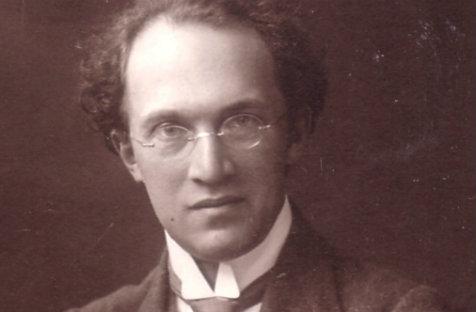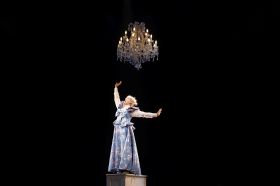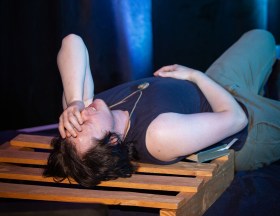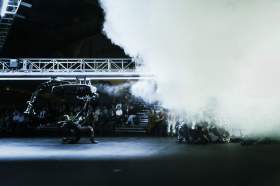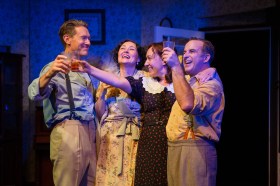Clearly the Sydney Symphony is doing something to its pianists. Indeed, over the past year or two, whenever there is a musician ill, it invariably (bar one time, if I recall correctly) is a pianist that has issues with their health. It’s happened so often, and in such a focused way, that one suspects there might be some sort of curse hovering over Sydney, some billowing black cloud of RSI or what have you, that strikes only the most dexterous of performers.
But the show must go on, as they say (although I, too, have said it enough times, so surely I am part of ‘they’ as well by now?), and the Sydney Symphony always manages to find a replacement to pedal in at the last moment. Ian Munro, for instance, was a substitute last year – a pianist well known to Sydney audiences, especially to fans of the Australia Ensemble. And perhaps the other most well known local player is Kathryn Selby – she of Selby & Friends, artists in residence at the City Recital Hall – and it was she who took up the call from the lonely black and whites.
The Mozart in the City series of concerts, given four times throughout the year in the smaller City Recital Hall venue, are, on the whole, a delightful diversion from the Concert Hall programs. Though to say ‘diversion’ suggests that there’s something less serious about the performances, something a bit off-hand. Yet this is not the case. It’s a difference in the level of intimacy, I find, that makes these concerts special. Imagine the grandiose spectacle and decorum of a bursting-at-the-seams orchestra, and then the reach-out-and-touch closeness of a string quartet, then find a place somewhere in the middle of that spectrum and that is what we had on the evening in question.
It’s a smaller orchestra, yes, but because of the size and acoustics of the City Recital Hall, one still gets that lovely fullness of sound – that pleasant drenching of the ear drums – that a bigger orchestra can provide. (One remembers a performance, by the Sydney Symphony, of Strauss’ Metamorphosen, Study for 23 solo strings in the Concert Hall last year, which was constantly marred by the fact that, even at its loudest, the sound would always dissipate too soon – if ever there had been a piece for the City Recital Hall, it was that.)
And it was precisely all these conditions that Franz Schreker’s Kammersymphonie (Chamber Symphony) needed to shine. Conductor (and principal violist) Roger Benedict, speaking in an entirely unexpected accent (that is, English – one had never bothered to question whether he was native or not) explained to us, mid stage-change, that no one in the orchestra had ever played a Schreker piece before. He asked the audience if anyone had ever heard a piece of his before, and – assuming that some sort paralysis en masse hadn’t been inflicted on the crowd – no one in the stalls had heard a piece of his either.
The reason for this is not the obvious conclusion that one may jump to – that is, that his music is terrible, so of course no one ever plays it anymore. Rather, the Austrian Schreker was as famous as Richard Strauss was, back in the day, but then the Nazis came to power and put a stop to his success. (He was Jewish.) It’s only recently, according to the program notes, that his music is finally starting to be recognised. Considering that this critic was one of those in the audience who didn’t put his hand up, I can hardly speak to his entire oeuvre, but if his Kammersymphonie is anything to go by, he was a very talented composer. Indeed, this performance by the Sydney Symphony was one of the highlights of my concert-going year so far. In one 25 minute movement, it goes from delicacies to full bluster (ably reverberated by the City Recital Hall) with the occasional salting of, among other things, pastoral flavours. It was, in a word, engrossing, and one looks forward to hopefully hearing more of Schreker’s work in the coming years (assuming that the piece wasn’t merely a flash in the pan).
The penultimate piece for the evening (the Mozart in the City concerts having no intervals) was a slight disappointment, however. Mozart’s Piano Concerto No.27 in B flat, K595 needs no introduction, although for those of you playing at home, it was the last piano concerto that he wrote. Selby gave a performance best described as lovely and sweet, but not much more. The skill was there, but her presence on stage seemed a bit underwhelming. One likes a concerto to grab one’s attention and not let it go, but this seemed content to be by itself.
Lastly, we were treated to a Mozart Mystery Moment, where the audience isn’t told what the piece is until the day after. One’s heart was in one’s mouth when the stage crew started to shift things around – one wondered whether they were going to take the piano off just to play a five minute encore – but thankfully it was only being moved a bit upstage. The piece was the slow movement from Mozart’s (obviously) Quintet in E for piano and winds, K452, and passed without much of an effect, unfortunately. Still, the Schreker was worth the price of admission alone, even if it was somewhat let down by what followed.
Rating: 4 stars out of 5
Selby Plays Mozart
Sydney Symphony
Roger Benedict (conductor), Kathryn Selby (piano)
Franz Schreker – Kammersymphonie (Chamber Symphony)
Wolfgang Amadeus Mozart – Piano Concerto No.27 in B flat, K595
Wolfgang Amadeus Mozart – slow movement from Quintet in E for piano and winds, K452
City Recital Hall, Angel Place, Sydney
28 March

